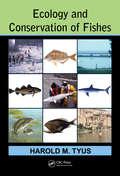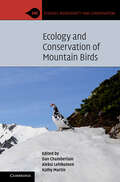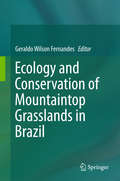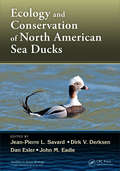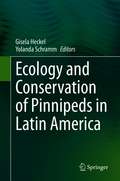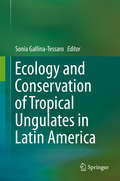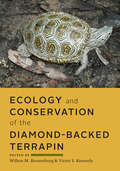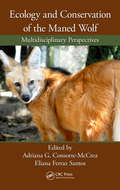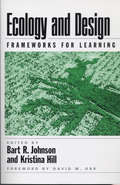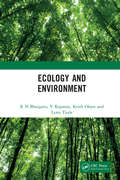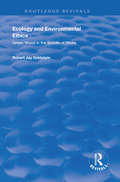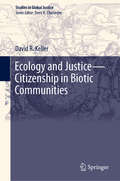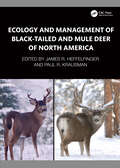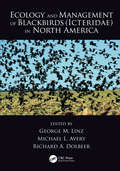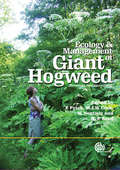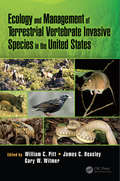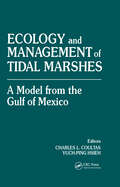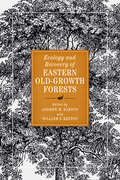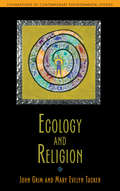- Table View
- List View
Ecology and Conservation of Fishes
by Harold M. TyusWritten as a stand-alone textbook for students and a useful reference for professionals in government and private agencies, academic institutions, and consultants, Ecology and Conservation of Fishes provides broad, comprehensive, and systematic coverage of all aquatic systems from the mountains to the oceans. The book begins with overview discussio
Ecology and Conservation of Forest Birds (Ecology, Biodiversity and Conservation )
by Robert J. Fuller Grzegorz Mikusiński Jean-Michel RobergeEcology and Conservation of Forest Birds is a unique review of the current understanding of the relationships between forest birds and their changing environments. Large ecological changes are being driven by forest management, climate change, introduced pests and pathogens, abiotic disturbances, and overbrowsing. Many forest bird species have suffered population declines, with the situation being particularly severe for birds dependent on attributes such as dead wood, old trees and structurally complex forests. With a focus on the non-tropical parts of the northern hemisphere, the text addresses the fundamental evolutionary and ecological aspects of forest birds using original data analyses and synthesising reviews. The characteristics of bird assemblages and their habitats in different European forest types are explored, together with the macroecological patterns of bird diversity and conservation issues. The book provides a valuable reference for ecologists, ornithologists, conservation professionals, forest industry employees, and those interested in birds and nature.
Ecology and Conservation of Lesser Prairie-Chickens (Studies in Avian Biology)
by Clint W. Boal David A. HaukosShortlisted for the 2018 TWS Wildlife Publication Awards in the edited book categoryLesser Prairie-Chickens have experienced substantial declines in terms of population and the extent of area that they occupy. While they are an elusive species, making it difficult at times to monitor them, current evidence indicates that they have been persistently
Ecology and Conservation of Mountain Birds (Ecology, Biodiversity and Conservation)
by Kathy Martin Dan Chamberlain Aleksi LehikoinenHigh mountain habitats are globally important for biodiversity. At least 12% of birds worldwide breed at or above the treeline, many of which are endemic species or species of conservation concern. However, due to the challenges of studying mountain birds in difficult-to-access habitats, little is known about their status and trends. This book provides the first global review of the ecology, evolution, life history and conservation of high mountain birds, including comprehensive coverage of their key habitats across global mountain regions, assessments of diversity patterns along elevation gradients, and adaptations for life in the alpine zone. The main threats to mountain bird populations are also identified, including climate change, human land use and recreational activities. Written for ecologists and naturalists, this book identifies key knowledge gaps and clearly establishes the research priorities needed to increase our understanding of the ecology of mountain birds and to aid in their conservation.
Ecology and Conservation of Mountaintop grasslands in Brazil
by Geraldo Wilson FernandesThis book is a pioneer attempt to bring forward the first synthesis on the most diverse and threatened mountain top vegetation of South America, the rupestrian grasslands. It brings to light the state of the art information on this ecosystem geology, soil formation and distribution, environmental filters that lead to biodiversity, species interactions and their fine tuned adaptations to survive the harsh mountain environment. The human dimensions of the rupestrian grassland are also addressed, including the anthropogenic threats that may irreversibly impact biodiversity and ecosystem services. The book also highlights the ongoing studies on ecological restoration and first attempt to model the impacts of climate change on its speciose biota.
Ecology and Conservation of North American Sea Ducks (Studies in Avian Biology)
by Dirk V. Derksen Dan Esler John M. Eadie Jean-Pierre L. SavardThe past decade has seen a huge increase in the interest and attention directed toward sea ducks, the Mergini tribe. This has been inspired, in large part, by the conservation concerns associated with numerical declines in several sea duck species and populations, as well as a growing appreciation for their interesting ecological attributes. Reflec
Ecology and Conservation of Pinnipeds in Latin America
by Gisela Heckel Yolanda SchrammPinnipeds are marine mammals that include eared seals, true seals, and walruses. This book presents detailed reviews on the ecology and conservation of 10 pinniped species along the coasts and islands in Latin America, from Mexico to Chile and Argentina. Topics covered include their population dynamics, trophic ecology, reproduction, and behavior. In addition, the book addresses major conservation issues regarding climate change, interaction with fisheries, ecotourism, and other human activities.
Ecology and Conservation of Tropical Ungulates in Latin America
by Sonia Gallina-TessaroThis book brings together the latest information on tropical ungulates in different Latin American countries. These animals are not only important from the point of view of their role in different ecosystems, but also have cultural value for people. The book also discusses topics such as habitat transformation and hunting as these species are an important source of food in many places. Addressing ungulate natural communities in diverse ecosystems and countries, the book provides information on specific aspects of each of the most representative species, and highlights topics to help readers better understand these species and develop effective management and conservation strategies. The information presented also reveals the need for more knowledge and will hopefully provide the incentive for continued studies on this important group of animals. This publication serves as a reference for academic research on ungulate ecology, behavior and dynamics, as well as the basis for conservation strategies.
Ecology and Conservation of the Diamond-backed Terrapin
by Willem M. Roosenburg and Victor S. KennedyA fascinating look at the diamond-backed terrapin—an important, iconic, and imperiled American reptile.The diamond-backed terrapin is not only a uniquely evolved and beautiful turtle, it also has a long history as a vital American food source. Once so numerous that people reportedly grew tired of eating them, diamond-backed terrapins are greatly reduced in numbers today and have become an icon of salt marsh conservation. Considerably diminished in some areas and struggling to survive, this distinctive brackish water turtle is the focus of intense conservation efforts. In Ecology and Conservation of the Diamond-backed Terrapin, leading terrapin researcher Willem M. Roosenburg and experienced science editor Victor S. Kennedy have brought together a group of expert scientists to summarize our current understanding of terrapin biology, physiology, behavior, and conservation efforts. Over the course of 19 comprehensive chapters, contributors • review the latest information on this charismatic species • provide a detailed summary of the terrapin's natural history • explain the threats to terrapin population stability throughout their range• examine ongoing conservation efforts to ensure the reptile's survival• present convincing arguments for the value of the diamond-backed terrapin as an estuarine indicator organism• use the terrapin as a model for studying the consequences of exploitation and environmental degradation on long-lived speciesThis exceptional book provides pivotal information for estuarine and turtle biologists, terrapin enthusiasts, natural historians, educators, conservationists, resource managers, and students. Ecology and Conservation of the Diamond-backed Terrapin is the definitive volume on this important American reptile.Contributors: Benjamin K. Atkinson, Harold W. Avery, Patrick J. Baker, Ralph E.J. Boerner, Russell L. Burke, Joseph A. Butler, Randolph M. Chambers, Paul E. Converse, Brian A. Crawford, Rusty D. Day, Dana J. Ehret, J. Whitfield Gibbons, Kathryn M. Greene, Leigh Anne Harden, Andrew S. Harrison, Kristen M. Hart, George L. Heinrich, Dawn K. Holliday, Victor S. Kennedy, Shawn R. Kuchta, Lori A. Lester, Jeffrey E. Lovich, John C. Maerz, David Owens, Allen R. Place, Taylor Roberge, Willem M. Roosenburg, Richard A. Seigel, Amanda Southwood Williard, Edward A. Standora, Anton D. Tucker, Diane C. Tulipani, Timothy J. Walsh, Thane Wibbels, Will Williams, Roger C. Wood
Ecology and Conservation of the Maned Wolf: Multidisciplinary Perspectives
by Adriana G. Consorte-McCrea Eliana Ferraz SantosWolves are controversial figures worldwide and much effort has focused on how to conserve them while addressing public concerns. With its solitary habits and fruit-eating diet, the endangered maned wolf roams the South American grasslands and swamps, playing a vital part in maintaining biodiversity hotspots. In recent years, much effort has focused on the discussion of how to conserve large carnivores, such as wolves, while addressing public concerns. Gathering the work of leading researchers from diverse areas and countries, this book covers up-to-date research on the biology, ecology, and conservation of the maned wolf. It presents innovative insights that can benefit conservation strategies (in and ex situ health, feeding ecology, distribution, and people's attitudes) and offers diverse perspectives for the future of the species (education, human dimensions, ethnoconservation, and habitat studies).
Ecology and Design: Frameworks For Learning
by Kristina Hill Robert Melnick Bart JohnsonProfessionals, faculty, and students are aware of the pressing need to integrate ecological principles into environmental design and planning education, but few materials exist to facilitate that development.Ecology and Design addresses that shortcoming by articulating priorities and approaches for incorporating ecological principles in the teaching of landscape design and planning. The book explains why landscape architecture and design and planning faculty should include ecology as a standard part of their courses and curricula, provides insights on how that can be done, and offers models from successful programs. The book: examines the need for change in the education and practice of landscape architecture and in the physical planning and design professions as a whole asks what designers and physical planners need to know about ecology and what applied ecologists can learn from design and planning develops conceptual frameworks needed to realize an ecologically based approach to design and planning offers recommendations for the integration of ecology within a landscape architecture curriculum, as an example for other design fields such as civil engineering and architecture considers the implications for professional practice explores innovative approaches to collaboration among designers and ecologistsIn addition to the editors, contributors include Carolyn Adams, Jack Ahern, Richard T. T. Forman, Michael Hough, James Karr, Joan Iverson Nassauer, David Orr, Kathy Poole, H. Ronald Pulliam, Anne Whiston Spirn, Sandra Steingraber, Carl Steinitz, Ken Tamminga, and William Wenk. Ecology and Design represents an important guidepost and source of ideas for faculty, students, and professionals in landscape architecture, urban design, planning and architecture, landscape ecology, conservation biology and restoration ecology, civil and environmental engineering, and related fields.
Ecology and Environment
by R N Bhargava V Rajaram Keith Olson Lynn TiedeThe alarming rise in greenhouse gas and pollution level which has resulted in serious environmental and ecological harm is the biggest concern today. It has not only made the lives of mankind miserable but also threatens their very existence. Ecology and Environment has delved in depth on the subject and brings a broad perspective of the various issues. Following the curriculum of University Grants Commission, the book covers different types of ecosystem on the earth. It deals with the effective and sustainable use of natural resources which includes water, forest, mineral resources in the ground and productive land. The book explains the population trends in the world and India, and how it is impacting the environment. The role of public participation in promoting environmental sustainability is explored too. Please note: This volume is Co-published with The Energy and Resources Institute Press, New Delhi. Taylor & Francis does not sell or distribute the Hardback in India, Pakistan, Nepal, Bhutan, Bangladesh and Sri Lanka
Ecology and Environmental Ethics: Green Wood in the Bundle of Sticks (Routledge Revivals)
by Robert Jay GoldsteinOriginally published in 2004. Examining the successes and failures of three decades of environmental law, this absorbing book reconsiders some of the policies devised to remedy centuries of abuse of the planet. It acknowledges the advances made using technological standards to effect pollution control as well as rudimentary systems that regulate use of land at the local level. However, as the author observes, these systems have limitations in solving vexing problems such as sprawl and non-point source pollution, as the cost of their use can easily outweigh the benefits. He suggests a system, termed 'Green Wood in the Bundle of Sticks', that provides the necessary theoretical and historical bases to bridge the gap between the potentials of each system. Using objective criteria based on science, this system is tied to a land ownership system that also takes into account societal concerns at a broader level.
Ecology and Evolution of Rhizobia: Principles and Applications
by En Tao Wang Wen Feng Chen Chang Fu Tian Wen Xin Chen J. Peter YoungThis book reviews the history and development of rhizobial ecology (diversity, function and interactions with the biotic and abiotic environments), evolution (genome diversification, systematics of symbiotic genes) and application. Further, it describes the new concept of rhizobia, the latest systematic methods, biogeographic study methods, and genomic studies to identify the interactions between rhizobia, legumes and environments. To enable readers to gain a comprehensive understanding of rhizobial biogeography, the book provides effective protocols for the selection and application of high-efficiency rhizobial inoculants. In addition, it presents standard and modern methods used in studies on rhizobial ecology and evolution in dedicated appendices, making it a unique and valuable handbook for researchers.
Ecology and Experience
by Richard J. Borden Darron CollinsA philosophical and narrative memoir, Ecology and Experience is a thoughtful, engaging recounting of author Richard J. Borden's life entwined in an overview of the intellectual and institutional history of human ecology--a story of life wrapped in a life story. Borden shows that attempts to bridge the mental and environmental arenas are uncertain, but that rigid conventions and narrow views have their dangers too. Human experience and the natural world exist on many levels and gathering from both realms gives rise to novel constellations. In a blend of themes and approaches based on a lifetime of interdisciplinary inquiry, the author wanders these intersections and invites us to exercise our capacities for ecological insight, to deepen the experience of being alive, and, most of all, to more fully enrich our lives.ContentsForeword by Darron Collins, president of the College of the AtlanticPrefacePart I. Transects and Plots1. The Arc of Life2. Ecology3. Experience4. Human Ecology5. EducationPart II. Facets of Life6. Time and Space7. Death in Life8. Personal Ecology9. Context10. Metaphor and MeaningPart III. Wider Points of View11. Kinds of Minds12. Insight13. Imagination14. Keyholes15. Ecology and Identity16. The Unfinished CoursePart IV. CodaFrom the Trade Paperback edition.
Ecology and Justice—Citizenship in Biotic Communities (Studies in Global Justice #19)
by David R. KellerThis is the first book to outline a basic philosophy of ecology using the standard categories of academic philosophy: metaphysics, axiology, epistemology, aesthetics, ethics, and political philosophy. The problems of global justice invariably involve ecological factors. Yet the science of ecology is itself imbued with philosophical questions. Therefore, studies in ecological justice, the sub-discipline of global justice that relates to the interaction of human and natural systems, should be preceded by the study of the philosophy of ecology. This book enables the reader to access a philosophy of ecology and shows how this philosophy is inherently normative and provides tools for securing ecological justice. The moral philosophy of ecology directly addresses the root cause of ecological and environmental injustice: the violation of fundamental human rights caused by the inequitable distribution of the benefits (economies) and costs (diseconomies) of industrialism. Philosophy of ecology thus has implications for human rights, pollution, poverty, unequal access to resources, sustainability, consumerism, land use, biodiversity, industrialization, energy policy, and other issues of social and global justice. This book offers an historical and interdisciplinary exegesis. The analysis is situated in the context of the Western intellectual tradition, and includes great thinkers in the history of ecological thinking in the West from the natural sciences, social sciences and humanities. Keller asks the big questions and surveys answers with remarkable detail. Here is an insightful analysis of contemporary, classical, and ancient thought, alike in the ecological sciences, the humanities, and economics, the roots and fruits of our concepts of nature and of being in the world. Keller is unexcelled in bridging the is/ought gap, bridging nature and culture, and in celebrating the richness of life, its pattern, process, and creativity on our wonderland Earth. Holmes Rolston, III University Distinguished Professor, Colorado State UniversityAuthor of A New Environmental Ethics: The Next Millennium for Life on Earth (2012) Mentored by renowned ecologist Frank Golley and renowned philosopher Frederick Ferré, David Keller is well prepared to provide a deep history and a sweeping synthesis of the "idea of ecology"—including the metaphysical, epistemological, and ethical aspects of that idea, as well as the scientific. J. Baird Callicott University Distinguished Research Professor, University of North TexasAuthor of Thinking Like a Planet: The Land Ethic and the Earth Ethic (2013)
Ecology and Management of Black-tailed and Mule Deer of North America
by James R. Heffelfinger and Paul R. KrausmanBlack-tailed and mule deer represent one of the largest distributions of mammals in North America and are symbols of the wide-open American West. Each chapter in this book was authored by the world’s leading experts on that topic. Both editors, James R. Heffelfinger and Paul R. Krausman, are widely published in the popular and scientific press and recipients of the O. C. Wallmo Award, given every two years to a leading black-tailed and mule deer expert who has made significant contributions to the conservation of this species. In addition, Heffelfinger has chaired the Mule Deer Working Group sponsored by the Western Association of Fish and Wildlife Agencies for more than 15 years. This working group consists of the leading black-tailed and mule deer experts from each of 24 states, provinces, and territories in western North America, putting them at the forefront of all conservation and much of the research on this species. The book represents all current knowledge available on these deer, including how changing conditions such as fires, habitat alteration and loss, disease, climate change, socio-economic forces, energy development, and other aspects are influencing their distribution and abundance now and into the future. It takes a completely fresh look at all chapter topics. The revisions of distribution, taxonomy, evolution, behavior, and new and exciting work being done in deer nutrition, migration and movements, diseases, predation, and human dimensions are all assembled in this volume. This book will instantly become the foundation for the latest information and management strategies to be implemented on the ground by practitioners and to inform the public. Although this book is about deer, the topics discussed influence most terrestrial wildlife worldwide, and the basic concepts in many of the chapters are applicable to other species.
Ecology and Management of Blackbirds (Icteridae) in North America
by George M. Linz Michael L. Avery Richard A. DolbeerShortlisted for the 2018 TWS Wildlife Publication Awards in the edited book category The various species of new world blackbirds, often intermingled in large foraging flocks and nighttime roosts, collectively number in the hundreds of millions and are a dominant component of the natural and agricultural avifauna in North America today. Because of their abundance, conspicuous flocking behavior, and feeding habits, these species have often been in conflict with human endeavors. The pioneering publications on blackbirds were by F. E. L. Beal in 1900 and A. A. Allen in 1914. These seminal treatises laid the foundation for more than 1,000 descriptive and experimental studies on the life histories of blackbirds as well as their ecology and management in relation to agricultural damage and other conflicts such as caused by large winter roosting congregations. The wealth of information generated in over a century of research is found in disparate outlets that include government reports, conference proceedings, peer-reviewed journals, monographs, and books. For the first time, Ecology and Management of Blackbirds (Icteridae) in North America summarizes and synthesizes this vast body of information on the biology and life histories of blackbirds and their conflicts with humans into a single volume for researchers, wildlife managers, agriculturists, disease biologists, ornithologists, policy makers, and the public. The book reviews the life histories of red-winged blackbirds, yellow-headed blackbirds, common grackles, and brown-headed cowbirds. It provides in-depth coverage of the functional roles of blackbirds in natural and agricultural ecosystems. In doing so, this authoritative reference promotes the development of improved science-based, integrated management strategies to address conflicts when resolutions are needed.
Ecology and Management of Giant Hogweed
by P. Pysek M. J. W. Cock W. Nentwig H. P. RavnThis book is an authoritative compendium of current knowledge on this amazing invasive plant and will facilitate improved management. It is an invaluable resource for both practitioner and student, and covers topics including taxonomy, genetics, reproduction, population ecology, and invasion dynamics.
Ecology and Management of Terrestrial Vertebrate Invasive Species in the United States
by William C. Pitt James Beasley Gary W. WitmerVertebrate invasive species are important ecologically, socially, and scientifically throughout much of the globe. However, the interdiction and options for management of invasive species are driven by localized regulation at the country or even state level and thus the management of species must be framed within that context. This book is focused around the management of invasive vertebrate species in the United States, although readers will find much of the material broadly applicable to invasive species in other regions. Vertebrate invasive species cause damage to agriculture, property, natural resources, and threaten human health and safety. However, most of these species occur in the United States resulting from human-mediated activities, often being released intentionally. For the first time, the wealth of scientific information about vertebrate invasive species in the United States is summarized and synthesized in a single volume to be easily accessible to ecologists and natural resource managers. With a focus on prominent terrestrial invasive species that have a history of policy and management and highlighting contemporary issues and management, this book consists of 18 chapters written by experts from across the United States. The first section of the book focuses on overarching policy and management topics associated with vertebrate invasive species; including biosecurity threats and risk assessment, policy and regulation, and the economics of their management. The second section provides in-depth reviews of noteworthy invasive mammals, birds, amphibians, and reptiles. After finishing this book, the reader should understand the complexity of managing invasive species, the unique challenges that each new species may present, and the steps forward that may decrease the impact of these species on the environment, human health, and the economy.
Ecology and Management of Tidal MarshesA Model from the Gulf of Mexico
by Charles L. CoultasThis is a major compendium of the existing knowledge of the ecology and management of tidal marshes by some of the leading experts in the field. The major theme of the book is the interconnectedness of the marsh, plants, marine organisms, soils and geology, energy and money flow, and legal and management effects on the system.Emphasis is placed throughout on the fact that nature has provided a free service that can either be maintained and enhanced by man or destroyed and forever lost. At a time of declining fisheries, this book points the way to management strategies that are needed to effect improvement.
Ecology and Management of the North American Moose (Zoo & Aquarium Biology & Conservation)
by Charles Schwartz Albert FranzmannThe largest of all living deer, moose in North America range across a broad band of forest and glade that extends from Newfoundland to the Rocky Mountains, into Alaska, and as far south as Colorado. Prized by Native Americans and incorporated into their cultures, moose also were hunted by successive waves of European settlers. Nearly eradicated by the turn of the century, the continent-wide population has rebounded to an estimated one million, and the moose has become a ubiquitous symbol of the untrammeled northern wilderness. <p><P> The most comprehensive book ever published on the North American moose, this abundantly illustrated volume fully explains moose biology and ecology and assesses the increasingly complex enterprise of managing the species. Twenty-one wildlife biologists and researchers discuss moose taxonomy, reproduction and growth, feeding habits, behavior, population dynamics, relationships with predators, incidental mortality, and seasonal migration patterns. They analyze the effect of new strategies of moose habitat and harvest management--including the planting of late-winter cover, hunting regulations, and aerial and ground-level tracking methods. They also describe immobilization, handling, and translocation practices and discuss the future of moose management. <p> Increasingly, both human and wildlife requirements must be taken into account when scheduling hunting seasons, setting moose population goals, devising strategies to divert moose from roads, or enhancing moose habitats. Written by many of the world's foremost authorities on the species, Ecology and Management of the North American Moose offers wildlife managers, biologists, researchers, mammalogists, hunters, photographers, and the conservation-minded public a wealth of timely information about the status, distribution, and natural and life histories of these fascinating mammals."
Ecology and Recovery of Eastern Old-Growth Forests
by Andrew M. Barton William S. KeetonNorth American landscapes have been shaped by humans for millennia through fire, agriculture, and hunting. But the arrival of Europeans several centuries ago ushered in an era of rapid conversion of eastern forests to cities, farms, transportation networks, and second-growth woodlands. Recently, numerous remnants of old growth have been discovered, and scientists are developing strategies for their restoration that will foster biological diversity and reduce impacts of climate change. Forest ecologists William Keeton and Andrew Barton bring together an edited volume that breaks new ground in our understanding of eastern old-growth forest ecosystems and their importance for resilience in an age of rapid environmental change. Leading experts examine topics of contemporary forest ecology across a broad geographic canvas in the eastern United States.
Ecology and Religion (Foundations Contemporary Environmental)
by Mary Evelyn Tucker John GrimFrom the Psalms in the Bible to the sacred rivers in Hinduism, the natural world has been integral to the world's religions. John Grim and Mary Evelyn Tucker contend that today's growing environmental challenges make the relationship ever more vital. This primer explores the history of religious traditions and the environment, illustrating how religious teachings and practices both promoted and at times subverted sustainability. Subsequent chapters examine the emergence of religious ecology, as views of nature changed in religious traditions and the ecological sciences. Yet the authors argue that religion and ecology are not the province of institutions or disciplines alone. They describe four fundamental aspects of religious life: orienting, grounding, nurturing, and transforming. Readers then see how these phenomena are experienced in a Native American religion, Orthodox Christianity, Confucianism, and Hinduism. Ultimately, Grim and Tucker argue that the engagement of religious communities is necessary if humanity is to sustain itself and the planet. Students of environmental ethics, theology and ecology, world religions, and environmental studies will receive a solid grounding in the burgeoning field of religious ecology.
Ecology and Revolution
by Carl BoggsEcology and Revolution: Global Crisis and the Political Challenge is an in-depth exploration and analysis of the global ecological crisis (going far beyond the issue of global warming) in the larger context of historical conditions and political options shaped by the failure (and incapacity) of the existing political system to adequately confront the crisis.
